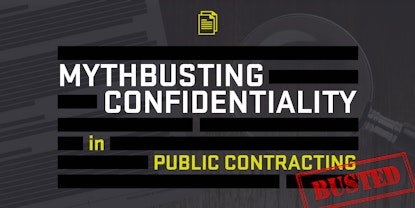Public procurement should be all about people. It’s a means to an end, not an end in itself.
Public contracts matter.
One in every three dollars spent by government is on a contract with a company. Public contracting is the world’s largest marketplace, covering $13 trillion of spending every year.
Given its scope and scale, procurement has a vast, untapped potential to address many of the most significant challenges facing our world. Yet, too many governments don’t seem to know what they are buying and selling, for how much, when and with whom they are dealing. And it’s government’s number one corruption risk.
Open contracting can change all this. We can transform how business is done by engaging stakeholders across government, business and civil society to collaborate on reforms, engage users, respond to feedback and to create open data & tools to drive systematic change.
A modern economy needs public procurement as a smart, user-friendly, digital public service. We bring governments, businesses, and citizens together to build one.
Open contracting is about publishing and using open, accessible and timely information on public contracting to engage citizens and businesses to fix problems and deliver results.
Open contracting works!
We have documented a whole range of benefits:
- Better value for money for governments
- Social inclusion: fairer competition and a level playing field for business, especially smaller firms
- Higher-quality goods, works, and services for citizens,
- Preventing fraud and corruption
- Smarter analysis and better solutions for public problems
- Environmental sustainability and resilience
Country evidence snapshots
Evidence from countries that are implementing open contracting shows that openness combined with monitoring helps build systemic change. Where open contracting reforms have taken root, we see continuous results. Find more details in our impact stories.
How open contracting can help tackle challenges
in key areas of public policy
A new global norm
Open contracting has become a new global norm, recommended and endorsed by global bodies such as the G7, the G20, OECD, the European Commission, the World Bank, the European Bank of Reconstruction and Development and the UN’s first-ever resolution on public procurement that followed a UN General Assembly Special Session against corruption.
Global open government and open data initiatives such as the Open Government Partnership and the Open Data Charter also support opening up public contracts as a priority issue. A government’s commercial relationships is one of the most valuable datasets that it possesses: it’s where the money and the power are in government.
Opening it leads to fundamentally better outcomes for government (more insight, analysis and efficiency), for business (fairer competition, ability to research the market, fostering entrepreneurship), civil society (improved integrity, better monitoring and tracking of service delivery), and ultimatey to better public services and lives for people. See here why openness is better and our strategy for how we measure this.
Our Global Principles were created by over 200 stakeholders across government, business and civil society. They provide a framework to guide policy and practical changes needed to transform our public spending worldwide to deliver massively increased value and quality.
But perhaps the best endorsement of open contracting is the 50+ cities, regions and governments opening up their contracting to get better results for their citizens.
The common 4 stages our partners want help with
We support systemic reforms for fair and effective public contracting. We help innovations jump scale. And we are building a global community to shape and share the policies, data, tools, and results that will get us there.
We see open contracting as a journey rather than a single destination. Here are the common stages during an open contracting reform our partners want help with. Click on each stage to find out more.
Publish, use and improve open contracting data
The world is moving from paper to data.
We help redesign public contracting – from planning, to tender and awards and onto contract management – as a user-friendly digital service with standardized open data to enable automated data gathering and business analytics and a variety of stakeholders to use the information.
Improve stakeholder engagement and oversight
Improving transparency and information is a means to an end. Acting on that information is what creates change. Engaging and responding to stakeholders leads to better planning, contracting and contract management processes. The evidence is clear: engineering feedback loops into public contracting encourages competition, fair play and better performance.
Measure, adapt and institutionalize reforms
Change is hard and progress is never linear. It is important to be agile, to have permission to experiment, measure and adapt. You need allies to succeed; sharing progress builds trust and engagement.
New policies and processes need to be hardwired into practices and embedded in legislation and institutional changes.
Set clear reform goals and secure buy-in
At the heart of open contracting is driving better results from procurement and from public contracts.
The whole contracting process should be simple, accessible and inclusive, designed with users across government, businesses, and civil society to maximize participation, integrity and efficiency.
We support reformers to set, measure and achieve their goals.
Follow the money
Open contracting is about following the money across the entire chain of public contracts from their planning to their tendering and award and onto their delivery and implementation. Our Open Contracting Data Standard provides a way to join all this information together with unique identifiers making all the information sortable and shareable.
Mythbusting commercial confidentiality
Learn more…
Publish
Learn how to publish data according to Open Contracting Data Standard (OCDS)
Use
Build skills to evaluate, analyze, and use open contracting data in a variety of different ways.
